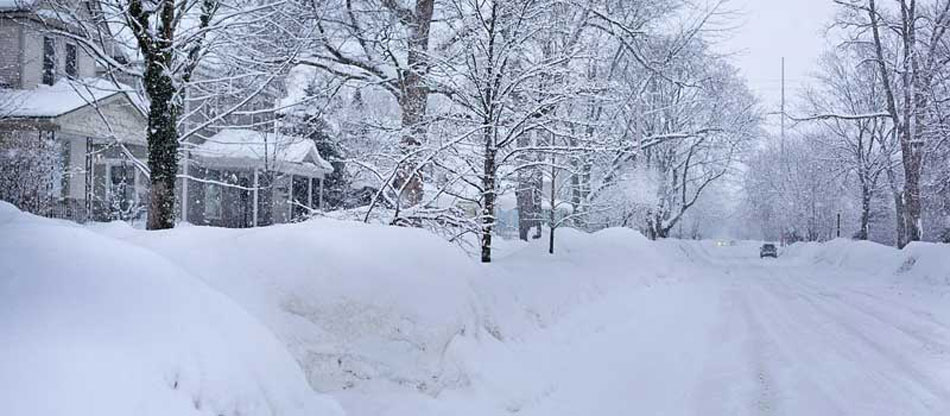
Will Rock Salt or Ice Melt Harm My Plants?
Snow and ice are an inevitable part of winter here in central NJ and PA, as are multiple trips to the store to load up on bags upon bags of ice melt or rock salt.
Unfortunately, the products we use to keep our roads and walkways safe also do untold damage to our property and local ecosystem, as well as harming our pets and our plants.
It’s not what they do during the winter that’s the problem – it’s what happens in the spring. As these salts dissolve into the melting ice water, they quickly travel into the soil where they do their greatest harm.
Types of Ice Melting Products
Rock salt (sodium chloride) is the cheapest method of melting snow and ice, and it’s the most commonly used.
The problem is that plants only need sodium in tiny, tiny amounts (the amount you’ll normally find in the municipal water supply). When large amounts of sodium are added to the soil, it can take the place of other more necessary nutrients, like potassium and calcium. And when there’s a high concentration of salt in the soil it can pull water out of the plants, causing them to shrivel up and die.
Sodium also affects soil texture by “tightening up” the small particles of clay causing compaction and poor drainage, and killing much of the soil biology.
You may also see Calcium Chloride, Magnesium Chloride, and even Potassium Chloride marketed as ice melting products.
Although sodium chloride is by far the worst for your landscape, the chlorine in these alternative ice melts isn’t much better. In fact, the chloride salts are generally corrosive and toxic, often scorching and killing much of the plant life alongside roads or walkways where splashing is an issue.
Pet Safe Ice Melt Products
 Most ice and snow melt products marketed as “pet safe” are urea based, which breaks down into a nitrogen-rich fertilizer. However, excessive runoff from these can also cause problems so use them sparingly.
Most ice and snow melt products marketed as “pet safe” are urea based, which breaks down into a nitrogen-rich fertilizer. However, excessive runoff from these can also cause problems so use them sparingly.
If you’re hesitant about ditching the salts altogether, a blend of urea and calcium chloride has shown to work better than just the little white pellets alone.
>> See 8 Ways to Create a Pet-Friendly Yard
Alternatives to Rock Salt For Melting Snow & Ice
Instead of using salt or chloride ice melts, consider some of the alternatives.
First and foremost, try to remove the snow and ice by shoveling walkways and paths before it accumulates and becomes difficult to remove.
Ice melt has no effect on light and fluffy snow, so using it as such wastes precious time, money, and material.
If removal isn’t a huge concern and you just need some traction, apply sand, cat litter, or another anti-skid material instead.
If you need to apply ice melt, do it sparingly and try to use the pet-safe alternatives.
Also, consider diluting your ice melt with hot water and spraying it on icy patches conservatively to reduce the amount of material you use. Spraying a liquid ice melt can also ensure a more even application and in turn may give better results.
Finally, take a note from the local road crews and, when possible, apply ice melt before the snow and ice occur to prevent buildup and make shoveling and removal easier.
How to Protect Your Landscape From Salt Damage
For roadsides and other areas that are prone to be affected by salt spray, a physical barrier (such as a temporary plastic or burlap fence) between your plants and the roadside can help.
When removing snow from walkways and driveways that have been treated with ice melt, shove the snow as far away from shrubs and landscape plants as you can.
If runoff is a problem, or salt spray is severe, you may want to consider replacing your plants with more salt-tolerant varieties, such as the ones shown below.
Salt Tolerant Trees, Shrubs and Perennials
- Eastern Red Cedar
- Junipers
- Japanese Black pine
- Lilacs
- Sumacs
- Blueberries
- Cranberries
- Some varieties of hollies
- Ice plant
- Daylilies
Plants That Don’t Tolerate Salt
- Pines
- Balsam fir
- Yew
- Locusts (may have some salt resistance, but results vary)
- Oaks (may have some salt resistance, but results vary)
- Maples (including box elders and tulip poplars)
- Willows
- Fruit trees can be especially sensitive
- Rhododendrons
- Azaleas
>> You can also read about winter lawn damage here!
